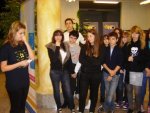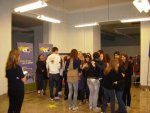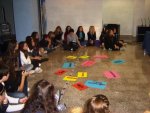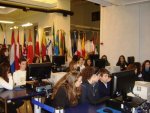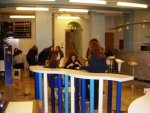.Spazio Europa was was born on 13th February 2009, inaugurated by Giorgio Napolitano.
Spazio Europa is a public space in the center of Rome run by the Information Office of the European Parliament for Italy, and by European Commission Representation in Italy. Its purpose is to make people feel Europe as something concrete. Another of his tasks is to promote the knowledge and the European discussion on main youth issues. It’s a center with many functions, it can host meetings, conferences and shows.
On the morning of Friday 3rd December, me and my class headed for via 4 Novembre to venture inside the so-called wonders contained in the famous Spazio Europa.
Just arrived, after a moment of loss, we were warmly greeted by a lady, speaking several foreign languages that explained us where we were, namely all the functions performed by the Spazio Europa and the program that we would follow that morning. Between a smile and a round of applause we were invited by two other girls to form a circle to begin one of the activities on the program.
After settling ,the two girls distributed a card to each of us telling us that, when they clapped their hands, we had to do what the note said. My card was about the German greeting, namely, stop around a few steps away and just raise your hand. After hearing the clapping, there was the utter chaos. My mates were running left and right hopping, or kissing the cheeks three times, taking your arms and shaking them so hard almost to rip them off, while other guys stopped meters distance between them and bowed. In short, the end result was a disaster, but the game was really cute and original.
Next, we moved to another room and they distributed a card to us. The card had the name of a country of Europe. In about 15 minutes, everyone should have found the other countries that helped to form a language family. In the end we had six groups:
1. Italian languages group: ( Latin, Romanian, Italian - Romance, Ibero-Romance );
2. Slavic languages group: (Belarusian, Russian, Ukrainian, Bulgarian, Macedonian, Serbo-Croatian, Slovenian, Czech, Slovak, Polish);
3. Finno-Ugric languages group: (Estonian, Finnish, Karelian, Lapp, Hungarian);
4. Germanic languages group: (Gothic, Danish, Swedish, Norwegian, Faroese, Icelandic, Bavarian, German, Luxembourgish, Schwytzertütsch, Walser, Yiddish, Afrikaans, Dutch, Flemish, Saxon, English, Frisian);
5. Baltic languages group: (Latvian, Lithuanian);
6. Greek languages group: (Greek, Ionic, Attic, Grecanico, Modern Greek, Doric, Zaconico, Wind).
After this activity, we went immediately to the next.
Our guides placed on the floor a cards with notes of words of other languages; the game was to watch the video and identify by ear the words on the ground.
Now, to me, the part most exciting comes. Our guides showed slides with the many chances to study and travel in Europe. In “Have your say”, teenagers are encouraged to debate and compare the views. One of the topics that interested me most,was the small trips. If I understand it, the two girls are part of an association that allows teenagers, with very little money, to leave for a week or two and make a linguistic experience. Just heard, I’d like to get more information about that.
At the end, we played a very interesting card game. The girls set groups of five or six people, and made them sit at their respective locations. At each table were given a note with the simple instructions of the game. One rule was very important, namely, no one could speak. The winner of each table was sent to another, and he had to understand the instructions watching the other gamers, this is because at each location rules were different. This game has been set up to show us how a person from another country must eventually be able to adapt to different rules, particularly the different language and different habits. I must admit that, despite some of my classmates did not like it at all, for me it was a great opportunity to learn something new, and truly believe that we should treasure these little experiences, because not all schools have had these opportunities.
By Gaia V. 14 years old
.On the 3rd of December 2010, my English and Spanish teachers took our class on a trip to the centre of Rome to visit “Spazio Europa”, which consists in an interactive journey with live activities to learn the different European Countries cultures and habits. We met at our school at about 8:45 a.m. and we started our trip. First we went to take the subway and then a bus to get to the building where "Spazio Europa" is. When we arrived, a lady that worked there as a translator introduced two girls who were our "tour guides". After a brief introduction of the program. we started our first activity that consisted in an experience of the different ways people greet each other depending on the European country. Each of the student had a sheet of paper referring to one country and the type of greeting used in that country. For example I had France, and in this country people greet each other kissing four times the cheeks of another person (one kiss per cheek in sequence).
This activity was fun, because we formed a circle, and when our guides told us to start, we had to greet a person randomly using the greeting instructions given in the sheet. Some of my mates had Germany , so they had to greet each other with a hand shake, but they had to stay at a big distance from the other person. (Wow! it’s so exaggerated, I think, but now I know that if I go to Germany, I must greet a person differently from my way of greeting). After this activity, the guides took us to a room where they usually have conferences; in that room there was a big screen , where we watched some videos about energy saving in different languages. It was fun.
However, the most beautiful activity was the last; a game with poker’s cards:
the guides divided us in 5 groups, then gave us some cards and a sheet of paper with the game’s rules. During the game, we were not allowed to speak, and if we had some problems we had to use gestures to make the others understand. For me it was easy, but for most of my mates it was hard, because they can’t keep quiet!
at the end of the first match, all the winners had to change the table, but they didn’t know that all the tables had different rules of the game, so, when all the matches finished, the guides asked us how the game was; all the winners said that it wasn’t very good, because changing the table they didn’t understand what they had to do.
From this game we understood that it was related to the habits of the countries, because all the times we leave our country to go to another country, even if we don’t understand the language, we try to keep us understanding with gestures, or if we have different habits from the country we go to, with time we can learn to adopt them.
This was the end of our morning and trip and even if the activities weren’t many, I enjoyed the trip very much. I hope that in the future my teachers will take us to other school trips like this again.
By Alissa L. , 14 years old
.On December 3rd, I and my class went to “spazio europa”. In the hall, two girls explained us why the languages are important, after we played some games with them. In the first game we had to greet each other in different ways because every country has different greetings, but also different habits and cultures. In the second game we learned which the European Union countries are and what their different linguistic origins are. After we watched four videos in 4 different languages. With the girls’ help, we understood all the videos. At the end we played cards, in every table the game was different (this represented a country and its culture). When a player changed table was like changing country. I liked these activities because it was interesting to know the different languages and cultures in the European Union.
By Roberta F. , 14 years old
.Hi! I and my class went to SPAZIO-EUROPA. I was very excited about this. We went downtown with our Spanish teacher and waited for our English teacher. Finally she arrived; we were in spazio-europa and all of my friends were very happy. Spazio-Europa is a very big place where many schools come to visit. There were 3 people to meet us at our arrival : the first one started to tell us what spazio-europa is.
The second asked us if we wanted to do a game together . The game was strange because there were 2 girls that gave to each of us a sheet of paper and we had to do what there was written on this paper . As the girls told “GO” each of us had to do a different things. The game started and my work was to kiss on cheeks as many people as I could. It was so strange but very cool! Many others had to give their hand to another person .
At the end of this game, we went to another room where there were many chairs and a big screen . We had to see some clips and later we had to recognize the words used in the movies and find them on some cards. When we saw them again , the girls helped us to understand the words and we learnt that there are many words that are very similar to Italian in fact now we can understand many languages because there are parts of some languages that are similar to other languages. In fact a translator that works there told us that it is very important to know the languages because they’re an important part of the world !
Later we had to go to another room where there was a big screen in which the girls had to speak about our possibility to do a foreign exam and they told us about our possibilities of the future and they told us that it is very important to study languages, and we are lucky because we can study these languages at school instead of paying special lessons to learn them.
At the end the girls divided us into different groups and they gave us a packet of cards and everyone of us had different rules to play in the game but the girls didn’t tell us that. That game was a comparison between a person who lives in his country and another one who is foreign and doesn’t know the language of that country. This was a very beautiful game because in this way we could understand what does it means ! I liked this school-trip because thanks to it we could understand what going abroad means !
Bye Virginia V. 14 years old
.When we got into “Spazio Europa”, we played a game about the greetings of the world. This play for me was very fun because in this way I understood the different greetings of each nation and I was amazed to see the gesture of a simple “CIAO, SALUT, HOLA or HI”. The second activity that we did was with the languages of the world. The third activity was about watching four different videos in four different languages, and we had to understand the meaning and the key words. As fourth activity we visited the web-sites of “Spazio Europa”, but this activity I can do at home. At the end we played with playing cards, but I didn’t like it because it was so boring and I didn’t win. I liked the trip and it was so interesting and fun.
By Annagiulia D. 14 years old
On 3rd December the class 1^h went to “Spazio Europa” in Rome. It is a place where we can learn about different language, for example which language does Swedish come from? Obviously it derives from the Germanic languages; later everyone gave us different languages belonging to European states, and we had to find the different languages that belonged to the same family. All this is a game.. We had fun.
After that we learnt different greetings in Europe! This game is very fun, at least for me!
Then we saw some videos in German, Romanian, Polish, Portuguese that talked about Saving The Earth, how we can save energy for the trees, and for us; and after watching these video we could choose different words in those languages. And I learn a lot of words! For example in Italian “energia”, in English you say “energy”, in German “energie”..but it was interesting to know some words. After that we learnt different ways to study and learn foreign languages in Europe, and we learnt about projects such as the Comenius! At the end we played a game with poker cards in which you take cards of the same suit and the same color, but the strangest thing was that you couldn’t talk and another thing was that when you changed table, you found different rules! So we had to explain things but we couldn’t talk. I think that we can talk English or another language with the voice..but also with non-verbal language! This output was very interesting because I realized that with the languages in the future you can do everything! And this summer I’d like to travel in Europe! I hope!!
Giorgia S. 14 years old
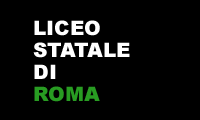
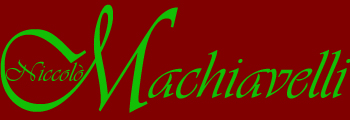
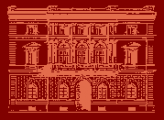
 Offerta Formativa
Offerta Formativa Visit to Spazio Europa - December 2010
Visit to Spazio Europa - December 2010